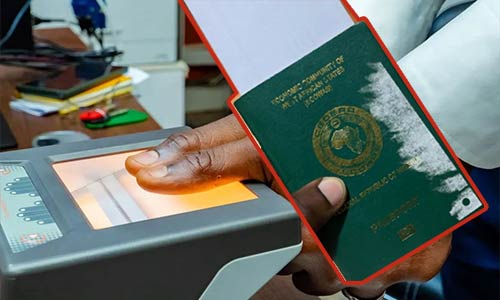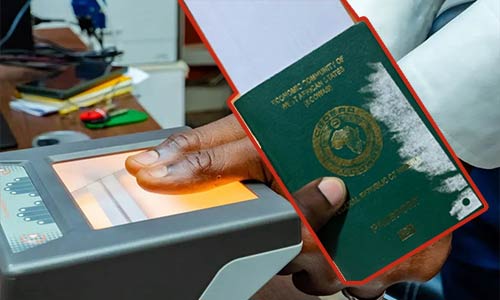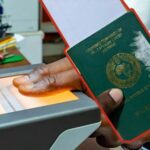
The Federal Government on Friday intensified its regional security posture and modernised its identity management architecture with the official rollout of the ECOWAS National Biometric Identity Card (ENBIC), marking a decisive push against transborder crimes, irregular migration and document fraud across West Africa.
The launch makes Nigeria the seventh ECOWAS country to operationalise the card, a project conceived by the regional bloc 11 years ago but now revived under what officials described as President Bola Tinubu’s renewed leadership and insistence on results.
Speaking at the ceremony, Minister of Interior, Dr Olubunmi Tunji-Ojo, said the ENBIC rollout heralds a powerful new beginning for secure mobility and regional integration, noting that the delay of more than a decade was uncharacteristic of Nigeria’s capacity.
He said, “It is unlike the Nigerian standard. That is very unusual, but the good news is that President Tinubu came in, insisted on delivery, and today the promise has become a reality. This is leadership in action, not about what we will do but what we have done.”
Tunji-Ojo described the biometric card as the foundation of a new security and identity ecosystem that will transform intelligence gathering and border control.
“You cannot protect who you do not know. Identification is the bedrock of security,” he said, explaining that the card will help tackle irregular migration, integrate with global public key directories like ICAO, and relieve pressure on Nigeria’s passport system by providing ECOWAS-bound travellers a simpler alternative.
“If you are not travelling outside ECOWAS, you don’t need a passport. This card takes you anywhere within the region,” he said.
He also linked the initiative to wider reforms championed by President Tinubu, including the 2024 deployment of the UN-mandated Advanced Passenger Information System (APIS), which allows authorities to identify travellers before arrival.
“This government inherited problems but refused to give excuses. It has straightened situations others postponed,” he said.
The minister added that the Immigration Service will next unveil the Single Travel Emergency Passport (STEP) in January to help stranded Nigerians return home seamlessly.
With the formal introduction of the ECOWAS National Biometric Identity Card, the minister said Nigeria is not only strengthening its borders but also reasserting its leadership in a region seeking deeper unity, safer mobility and a digital future built on shared prosperity.
Secretary to the Government of the Federation, Senator George Akume, represented by Permanent Secretary Mohammed Sanusi Danjuma, situated the rollout within Nigeria’s long-standing leadership in regional integration.
He recalled that the blueprint for the biometric system was first agreed at an ECOWAS summit hosted by Nigeria in 2014, adding that Friday’s launch stands as a monument to shared political will and proof of what West Africa can achieve when nations place collective security above individual interests.
He said the card represents far more than a digital credential. “Today we hold in our hands a simple card, but in our hearts we hold a profound hope,” he said, describing it as a symbol of dignity for migrant women, empowerment for cross-border traders, and a promise of a West Africa where borders become bridges to opportunity rather than barriers to progress.
Akume urged member states to accelerate nationwide rollouts and harmonise databases to create an interoperable identity architecture across the sub-region.
He also called on the private sector, especially fintechs, to build innovative services around the platform to deepen inclusion and drive digital transformation.
In her remarks, Comptroller-General of Immigration, Kemi Nandap, said the milestone is both technical and historic.
“This is a strategic leap forward in modernising our identity and travel management systems,” she said, praising President Tinubu’s Renewed Hope Agenda and commending the Interior Minister’s dynamic guidance in bringing the project to completion.
She explained that the ENBIC replaces the paper-based ECOWAS travel certificate and is built on advanced biometric and cryptographic technology compliant with ICAO and ECOWAS standards.
“Its biometric core, anchored on high-quality facial and fingerprint data, establishes a secure link between the holder and the credential. It will enhance verification, reduce document fraud, and disrupt transborder criminal networks,” she said.
Nandap added that the socioeconomic benefits are equally significant, as the card empowers small-scale traders, improves labour mobility, boosts tourism, speeds up border processing and strengthens cooperation across the region.
“It is a foundational instrument for a more secure, integrated and prosperous West Africa,” she said.
President of the ECOWAS Commission, Dr Omar Touray, praised Nigeria for once again providing leadership at a moment when the region faces grave security challenges.
“In this world crisis, the leadership of Nigeria inspires all the citizens of West Africa,” he said through a representative.
He disclosed that ECOWAS forces were currently in Guinea-Bissau preventing conflict, and he saluted Nigeria’s role in regional peace and development.













